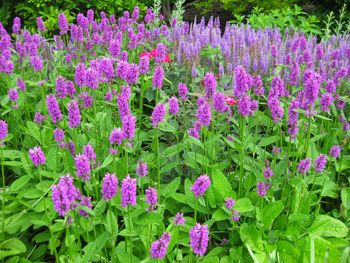Difference between revisions of "Betony"
| Line 1: | Line 1: | ||
| − | File:Stachys.jpg | + | [[File:Stachys.jpg|thumb|Alt=|350px|left|Stachys officinalis]] |
Other Names : Stachys officinalis, Bétoine, Betónica, Betonica officinalis, Bishopswort, Bishop Wort, Épiaire Officinale, Épiaire Vulgaire, Hedge Nettles, Stachys betonica, Stachys officinalis, Tabac des Gardes, Wood Betony.<br>Wood Betony is native to the British Isles and Europe and is known as Betonica officinalis (LINN), Stachya betonica (BENTH) or Stachys officinalis. It is a woodland plant like the bluebell and is one of the betony plants that grow in Britain. The others are Marsh Stachys or Clown’s Wort (Stachya palustris), the true Woundwort (Stachya germanica) which is perhaps not native to Britain, although it has become naturalized, Field Stachys (Stachya avensis) and Hedge Stachys or Hedge Wort (Stachya sylvatica).Here we deal only with wood betony. | Other Names : Stachys officinalis, Bétoine, Betónica, Betonica officinalis, Bishopswort, Bishop Wort, Épiaire Officinale, Épiaire Vulgaire, Hedge Nettles, Stachys betonica, Stachys officinalis, Tabac des Gardes, Wood Betony.<br>Wood Betony is native to the British Isles and Europe and is known as Betonica officinalis (LINN), Stachya betonica (BENTH) or Stachys officinalis. It is a woodland plant like the bluebell and is one of the betony plants that grow in Britain. The others are Marsh Stachys or Clown’s Wort (Stachya palustris), the true Woundwort (Stachya germanica) which is perhaps not native to Britain, although it has become naturalized, Field Stachys (Stachya avensis) and Hedge Stachys or Hedge Wort (Stachya sylvatica).Here we deal only with wood betony. | ||
==Special Precautions of Betony== | ==Special Precautions of Betony== | ||
Latest revision as of 05:27, 28 April 2019
Other Names : Stachys officinalis, Bétoine, Betónica, Betonica officinalis, Bishopswort, Bishop Wort, Épiaire Officinale, Épiaire Vulgaire, Hedge Nettles, Stachys betonica, Stachys officinalis, Tabac des Gardes, Wood Betony.
Wood Betony is native to the British Isles and Europe and is known as Betonica officinalis (LINN), Stachya betonica (BENTH) or Stachys officinalis. It is a woodland plant like the bluebell and is one of the betony plants that grow in Britain. The others are Marsh Stachys or Clown’s Wort (Stachya palustris), the true Woundwort (Stachya germanica) which is perhaps not native to Britain, although it has become naturalized, Field Stachys (Stachya avensis) and Hedge Stachys or Hedge Wort (Stachya sylvatica).Here we deal only with wood betony.
Special Precautions of Betony
- Pregnancy and breast-feeding: Not enough is known about the use of betony during pregnancy and breast-feeding.
- Surgery: Betony might affect blood pressure. So there is some concern that it might interfere with blood pressure control during and after surgery. Stop using betony at least 2 weeks before a scheduled surgery.
- Do not use the these herbs for any use, medicinal or otherwise, without first consulting a qualified doctor.
Health Benefits and uses of Betony are
- At this time, the only principal use for this remedy in fold medicine is as an herbal astringent, this beneficial effect is due to the high level of tannins present in the herb.
- for digestion problems including heartburn, diarrhea, and intestinal gas
- for breathing problems including bronchitis and asthma
- for painful conditions including gout, headache, and facial pain
- for urinary tract conditions including bladder and kidney stones (nephrolithiasis) and bladder pain and swelling (inflammation)
- It is also used to treat stress and tension, nervousness, and epilepsy.
- In combination with other herbs, betony is used to treat nerve pain (neuralgia) and anxiety.
